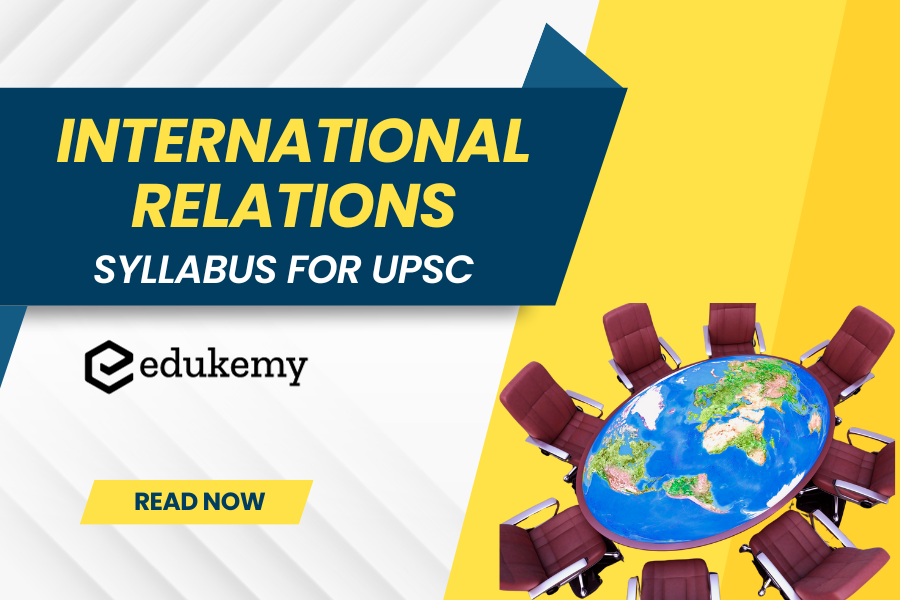
The International Relations syllabus for the Union Public Service Commission (UPSC) exam serves as a comprehensive framework designed to assess candidates’ understanding of global affairs and their ability to analyze and interpret international events. Recognizing the pivotal role of international relations in shaping the course of nations, this syllabus encompasses a broad spectrum of topics, ranging from the historical evolution of the international system to contemporary issues such as global governance, geopolitical dynamics, and transnational challenges. Aspirants are expected to delve into the intricacies of diplomatic relations, international organizations, and the impact of global economic forces. By navigating through this syllabus, candidates are not only equipped to comprehend the complexities of the world order but are also prepared to critically evaluate and formulate strategies for addressing the multifaceted challenges that characterize the international arena. In essence, the International Relations syllabus for UPSC lays the foundation for cultivating a nuanced understanding of the interconnected and dynamic nature of global politics.
Contents
- 1 International Relations – Topics and Sub-Topics
- 2 FAQs for International Relations Syllabus for UPSC
- 2.1 1. What is the scope of International Relations in the UPSC exam?
- 2.2 2. What are the key topics covered in the International Relations syllabus for UPSC?
- 2.3 3. How to approach the study of International Relations for UPSC?
- 2.4 4. What are the important international organizations covered in the syllabus?
- 2.5 5. Is knowledge of historical events necessary for International Relations preparation?
- 2.6 6. How can I stay updated on current international affairs for the exam?
- 2.7 7. Are there any specific regions that candidates need to focus on?
- 3 In case you still have your doubts, contact us on 9811333901.
International Relations – Topics and Sub-Topics
The UPSC (Union Public Service Commission) examination in India covers a wide range of topics in the field of International Relations (IR). Here is a list of main topics and sub-topics that candidates should focus on while preparing for the UPSC examination:
- Introduction to International Relations:
- Definition and Scope of International Relations
- Evolution of International Relations as a discipline
- Theories of International Relations (Realism, Liberalism, Constructivism, etc.)
- Historical Evolution of International Relations:
- Post-World War I and II international order
- Cold War and its aftermath
- Globalization and its impact on international relations
- Key Concepts in International Relations:
- Sovereignty
- Security
- Power
- National Interest
- Balance of Power
- International Institutions:
- United Nations (UN)
- International Monetary Fund (IMF)
- World Bank
- World Trade Organization (WTO)
- Regional Organizations (NATO, ASEAN, SAARC, etc.)
- Global Governance:
- International law and its importance
- Human rights and international humanitarian law
- Climate change and environmental governance
- Conflict and Conflict Resolution:
- Causes of conflicts
- Types of conflicts (inter-state, intra-state, global terrorism)
- Conflict resolution mechanisms (negotiation, mediation, arbitration)

- Diplomacy and Foreign Policy:
- Basics of diplomacy
- Tools of diplomacy
- Case studies of successful and unsuccessful diplomacy
- Emerging Issues in International Relations:
- Cybersecurity
- Artificial Intelligence and its impact
- Health diplomacy and global health issues
- International Economic Relations:
- Global economic institutions
- Trade and economic diplomacy
- Economic globalization and its challenges
- Current Affairs and Contemporary Issues:
- Ongoing international events and crises
- Analysis of global political developments
- Impacts of emerging technologies on international relations
- Case Studies:
- Analyzing historical and contemporary events through case studies
- Understanding the role of different actors in specific situations
- Indian Foreign Policy:
- Evolution of India’s foreign policy
- Bilateral and multilateral relations
- India’s role in global governance
FAQs for International Relations Syllabus for UPSC
1. What is the scope of International Relations in the UPSC exam?
International Relations is a significant part of the UPSC syllabus, covering global issues, diplomatic relations, international organizations, and geopolitical developments. It helps candidates understand the world’s political, economic, and social dynamics.
2. What are the key topics covered in the International Relations syllabus for UPSC?
The syllabus includes topics such as international institutions, bilateral and multilateral relations, global governance, security issues, conflicts, and contemporary challenges like climate change and terrorism.
3. How to approach the study of International Relations for UPSC?
Candidates should focus on understanding the historical context of international events, analyzing current affairs, and relating them to global perspectives. Reading newspapers, international relations journals, and standard reference books is essential.
4. What are the important international organizations covered in the syllabus?
The syllabus includes the United Nations (UN), World Bank, International Monetary Fund (IMF), World Trade Organization (WTO), and other regional organizations. Candidates should know their structure, functions, and current issues.
5. Is knowledge of historical events necessary for International Relations preparation?
Yes, historical context is crucial for understanding present-day international relations. Candidates should be familiar with major historical events, conflicts, and treaties that have shaped the world order.
6. How can I stay updated on current international affairs for the exam?
Regularly read newspapers, international affairs magazines, and online sources. Follow reputable websites, subscribe to newsletters, and make notes on significant global events and their implications.
7. Are there any specific regions that candidates need to focus on?
While the syllabus is broad, candidates should have a good understanding of major geopolitical regions like the Middle East, Asia-Pacific, Europe, and Africa. Regional groupings and alliances are also important.
In case you still have your doubts, contact us on 9811333901.
For UPSC Prelims Resources, Click here
For Daily Updates and Study Material:
Join our Telegram Channel – Edukemy for IAS
- 1. Learn through Videos – here
- 2. Be Exam Ready by Practicing Daily MCQs – here
- 3. Daily Newsletter – Get all your Current Affairs Covered – here
- 4. Mains Answer Writing Practice – here

